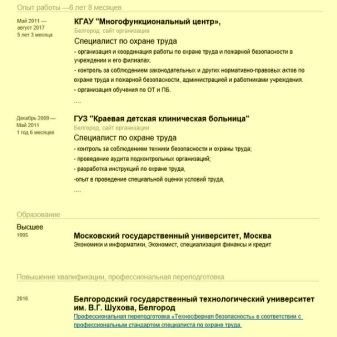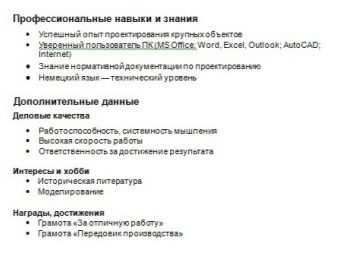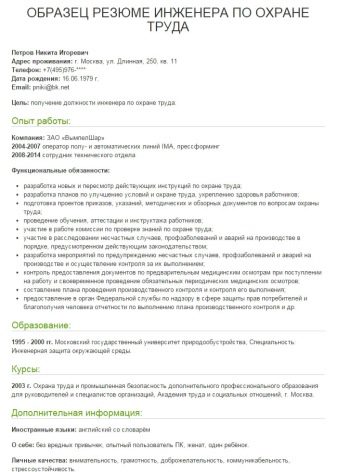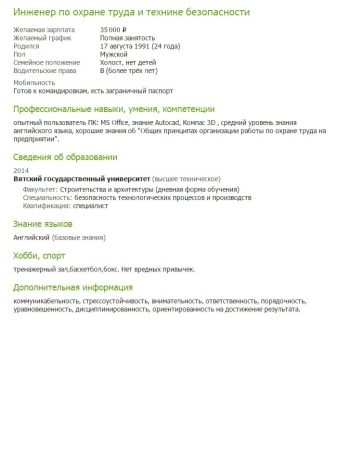Resume of a labor protection specialist: structure and rules of writing

Almost every large company has a labor protection specialist. In smaller companies, these responsibilities are usually assigned to an HR officer or a lawyer. However, it should be noted that it is undesirable to assign such responsibility to a person who is not trained and does not have an idea of what labor protection is. And if a person has experience in this position, he perfectly understands this. How to write a resume if you want to work specifically as an occupational safety engineer?
Structure
The work of a labor protection specialist or engineer is primarily associated with the observance of working conditions safe for the life and health of workers. This includes carrying out many activities: from legal and socio-economic to sanitary and hygienic and rehabilitation. And all this is done by one person (or department, if the organization is large).
Therefore, a person applying for such work must have knowledge and (preferably) work experience in a number of industries. The structure of a standard resume for an occupational safety professional is the same as for any other job: personal data, education, work experience, professional and personal qualities, desired salary.
In each of the sections, in as much detail as possible, but at the same time without unnecessary water, it is necessary to indicate exactly the experience and those qualities that are required to fulfill the duties of a labor protection specialist.

Recommendations for compilation
To the section "Personal data" be sure to add your mobile phone number, email address. The "Education" section is filled from earlier to later. First, information on secondary special or higher education is indicated, then - on retraining or advanced training.
A big plus for the applicant will be the presence of such a higher education as "State and Municipal Administration", "Educator-Psychologist" or profile - "Labor Protection". If you are applying for the position of Safety Engineer, then a specialist with an engineering degree is much more likely to be employed... If there is no specialized education, it is very desirable to complete specialized courses (and not some dubious ones, but those that have proven themselves well). It's also a good idea if you've taken legal literacy courses and are familiar with the laws and regulations governing occupational safety and health.
In the "Work experience" section, filling takes place in a different time sequence - from later to earlier. Indicate not only the name of the organization in which you worked, but also the time period, and the position you held, and the responsibilities that you performed. For employers, it is of great importance to have a successful experience in passing all kinds of checks, so if it is available, it is imperative to mention this.
If the applicant participated in the proceedings of industrial accidents, this can also be a big plus, especially in cases where a vacancy is opened in factories, plants, in a word, in places where this can happen with a high probability, and you need a person who can calmly and confidently begin to resolve the situation.
The knowledge of labor rationing is simply necessary for a specialist in his protection, otherwise how can he calculate whether the workers have too much overtime work?


If you have attended trainings or training in team management, the basics of pedagogy, be sure to indicate this. After all for an occupational safety engineer, having a minimum pedagogical knowledge is of great importance - the contingent with whom you will have to work can be very different and you need to find an approach to each.
Section "Professional and personal qualities" is created not in order to list everything that comes to mind, but in order to systematize and highlight precisely those qualities of the applicant, thanks to which he will successfully cope with the functions of an occupational safety specialist. There is no need to write phrases and words that every second candidate writes: “stress resistance, communication skills, diligence, literacy,” etc.
Write that you know how to negotiate with people, have pedagogical skills, are calm, behave confidently in non-standard situations, keep a cool head - be a little more inventive than others. Your resume should stand out from the crowd.
Never write a lie. Know how to work in 1C: Personnel, keep a timesheet there - be sure to specify. If you do not know how to work in Excel, do not be fooled that you can, because if you need to quickly demonstrate the skill of sorting or applying a filter in this program, you will not be able to do it "offhand". Write that you have basic skills and immediately start learning Excel for Beginners.
Never take credit for someone else's. Participated in the commission for the investigation of industrial accidents - write, but if you did not head it, do not indicate too much.
You should not write on your resume that does not apply to the position for which you are applying. Your broad outlook and play in the local league “What? Where? When?" are irrelevant to the occupational safety specialist.


Examples of
A sample resume for an occupational safety engineer might look like this.
Personal data: Full name, age, place of residence, phone number, e-mail address.
Education: name of educational institution, years of study, diploma specialty.Refresher courses are indicated after information about education in universities and secondary specialized educational institutions.
Work experience: name of the organization, period of work (start and end), position. The main areas of activity in the position held.
Professional and personal qualities: only what is important for the job in the profession for which the applicant applies.
Desired salary: indicate the amount that you would like to receive based not only on personal wishes, but also on the average earnings in the specified profession in the region where you live.










